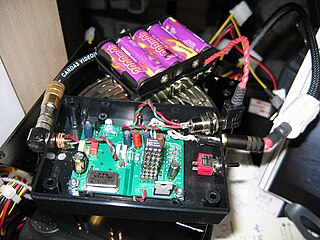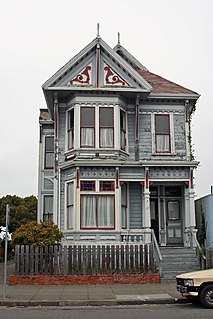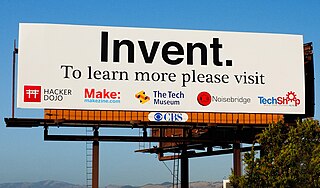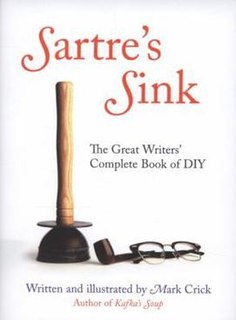 W
W"Do it yourself" ("DIY") is the method of building, modifying, or repairing things by oneself without the direct aid of professionals or certified experts. Academic research has described DIY as behaviors where "individuals use raw and semi-raw materials and parts to produce, transform, or reconstruct material possessions, including those drawn from the natural environment ". DIY behavior can be triggered by various motivations previously categorized as marketplace motivations, and identity enhancement.
 W
WIn the arts, bricolage is the construction or creation of a work from a diverse range of things that happen to be available, or a work constructed using mixed media.
 W
WBuilding BloQs is an open workshop in Enfield, London. A social enterprise, their emphasis is on creating and maintaining space and resources for people to make a living off their craft. The model is in response to rising rental prices and gentrification in London. In 2017, it had 300 professional members, a 10,000 square foot space, and was called a "proof of concept" for a new 55,000 square foot space. That new space will be part of a 200-acre, £6B urban development project called Meridian Water. The £2.7m project will make Building BloQs the biggest Open Workshop in Europe.
 W
WDIY Audio means "do it yourself" audio. Rather than buying a piece of possibly expensive audio equipment, such as a high-end audio amplifier or speaker, the person practicing DIY Audio will make it him/herself. Alternatively, a DIYer may take an existing manufactured item of vintage era and update or modify it. The benefits of doing so include the satisfaction of creating something enjoyable, the possibility that the equipment made or updated is of higher quality than commercially available products and the pleasure of creating a custom-made device for which no exact equivalent is marketed. Other motivations for DIY audio can include getting audio components at a lower cost, the entertainment of using the item, and being able to ensure quality of workmanship.
 W
W"Do it yourself" ("DIY") is the method of building, modifying, or repairing things by oneself without the direct aid of professionals or certified experts. Academic research has described DIY as behaviors where "individuals use raw and semi-raw materials and parts to produce, transform, or reconstruct material possessions, including those drawn from the natural environment ". DIY behavior can be triggered by various motivations previously categorized as marketplace motivations, and identity enhancement.
 W
WDIYbio is an informal umbrella organization for individuals and local groups active in do-it-yourself biology, encompassing both a website and an email list. It serves as a network of individuals from around the globe that aims to help make biology a worthwhile pursuit for citizen scientists, biohackers, amateur biologists, and do-it-yourself biological engineers who value openness and safety. It was founded by Jason Bobe and Mackenzie Cowell in 2008.
 W
WThe Eli Whitney Museum, in Hamden, Connecticut, is an experimental learning workshop for students, teachers, and families. The museum's main building is located on a portion of the Eli Whitney Gun Factory site, a gun factory erected by Eli Whitney in 1798. The museum focuses on teaching experiments that are the roots of design and invention, featuring hands-on building projects and exhibits on Whitney and A. C. Gilbert.
 W
WIn real estate vernacular, a fixer-upper is a property that will require repair, though it usually can be lived in or used as it is.
 W
WThe Four Thieves Vinegar Collective is an anarchist biohacking group founded in 2015 by Michael Laufer. They have published instructions for the "EpiPencil", an epinephrine autoinjector, and the "Apothecary MicroLab", a do-it-yourself (DIY) device intended to make a variety of medications, most notably pyrimethamine (Daraprim). They have been widely criticized by the medical community for causing potential harm to patients with the DIY instructions, but Laufer claims to defend people's right to attempt their own medical treatment.
 W
WGainclone or chipamp is a type of audio amplifier made by do-it-yourselfers, or individuals interested in DIY audio. It is a design based on high-power integrated circuits, particularly the National Semiconductor Overture series. The Gainclone is probably the most commonly built and well-known amplifier project amongst hobbyists. It is simple to build and involves only a few readily accessible, inexpensive parts. As an amplifier it is highly regarded by many in the DIY community.
 W
WHandmade Arcade is an annual independent craft fair in Pittsburgh, Pennsylvania. The fair focuses on sustainable, upcycled, recycled, and eco-friendly materials and techniques. Vendors come from multiple states; in 2012, participants came from 15 different states. For example, some pieces include purses made from recycled books, camera straps constructed from vintage fabrics, jewelry made from found objects, pillows constructed from vintage T-shirts, and organic bath and body products. Attendance has reached 10,000. In 2007 and 2009, it won the People’s Choice Award for Best Arts Event from the Greater Pittsburgh Arts Council.
 W
WPaul Nooncree Hasluck was an Anglo-Australian writer and editor. He was born in Australia in April 1854 but moved to the UK before 1881, and lived there till his death in London on 7 May 1931. He wrote about technical subjects and was a pioneer in the "do-it-yourself" category.
 W
WiFixit is an American e-commerce and how-to website which sells repair parts and publishes free wiki-like online repair guides for consumer electronics and gadgets. The company also performs product teardowns of consumer devices. It is a private company in San Luis Obispo, California. The company was founded in 2003, as a result of Kyle Wiens not being able to locate an Apple iBook G3 repair manual while the founders were attending Cal Poly.
 W
WIOIO is a series of open source PIC microcontroller-based boards that allow Android mobile applications to interact with external electronics. The device was invented by Ytai Ben-Tsvi in 2011, and was first manufactured by SparkFun Electronics. The name "IOIO" is inspired by the function of the device, which enables applications to receive external input ("I") and produce external output ("O").
 W
WKip Kedersha, better known as Kipkay, is an American author of how-to videos. As of 2008, Kedersha was the all-time top-grossing Metacafe user, having earned more than $120,000 for his series of instructional videos. The series broadcast on the internet and premiered on August 12, 2007. So far, more than 150 episodes have been made and the show can be found on distribution channels including YouTube and Blip. Kipkay's videos can be grouped into categories of pranks, D.I.Y, how-to, social experiments, and hacks.
 W
WLadderax is a modular shelving and storage system created by Robert Heal in 1964 for Staples of Cricklewood, London. It is an example of Mid-Century modern design.
 W
WlittleBits is a New York City-based startup that makes an open source library of modular electronics, which snap together with small magnets for prototyping and learning. The company's goal is to democratize hardware the way software and printing have been democratized. The littleBits mission is to "put the power of electronics in the hands of everyone, and to break down complex technologies so that anyone can build, prototype, and invent." littleBits units are available in more than 70 countries and used in more than 2,000 schools. The company was named to CNN's 10 Startups to Watch for 2013.
 W
WThe maker culture is a contemporary subculture representing a technology-based extension of DIY culture that intersects with hardware-oriented parts of hacker culture and revels in the creation of new devices as well as tinkering with existing ones. The maker culture in general supports open-source hardware. Typical interests enjoyed by the maker culture include engineering-oriented pursuits such as electronics, robotics, 3-D printing, and the use of computer numeric control tools, as well as more traditional activities such as metalworking, woodworking, and, mainly, its predecessor, traditional arts and crafts.
 W
WSAM Labs is a startup that makes app-enabled construction kits, designed for people of all ages to learn STEM, play, and create with technology and the Internet of Things. The company has been featured in WIRED and The Telegraph. Founded by Belgian born CEO Joachim Horn, the company works out of their headquarters in East London.
 W
WSartre's Sink is a literary pastiche in the form of a do it yourself handbook. It contains advice about how to undertake 14 common household tasks each written in the style of a famous author from history. Sartre's Sink is the second book by photographer and author Mark Crick. Excerpts have appeared in The Independent and the Evening Herald.
 W
WSelf-build is the creation of an individual home for oneself through a variety of methods. The self-builder's input into this process varies from doing the actual construction to contracting the work to an architect or building package company.